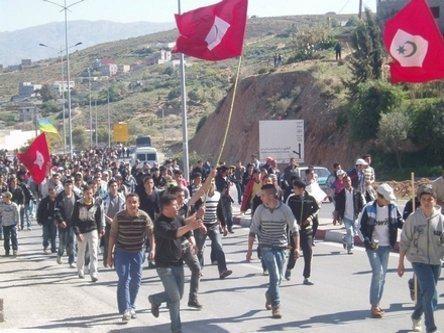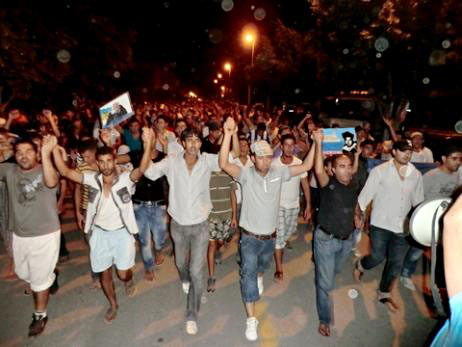The title of an article on the internet, “The harira [traditional Moroccan soup] simmers on a low fire”, sums up very well the slow but stubborn spreading of the revolt to the smaller towns in the mountainous area of the Rif.
In this northern region of Morocco the level of repression since October last year – the suspicious death of five youth, the murder of an activist, the abduction, arrest and torture of leaders of the 20F movement, the brutal police intervention against demonstrations, the plunder of shops by the uniformed hordes of the state, etc. – has not deterred the youth, nor their parents. Instead it had strengthened their resolve and radicalised them politically.
The spiralling of the state’s repressive measures and the massive counteraction of the youth reached a climax last week with the virtual occupation by the police of the city of Beni Bouayach [see Morocco: Revolt in the city of Beni Bouayach – Solidarity appeal against the ferocious repression]. A local general strike on March 5 and the blockade of the main roads leading into the town has led to a de facto insurrectionary situation. The population is also refusing to recognise the local council administration and correctly considers the police as “forces of occupation”.
“Down with Houlal VI”
The local state apparatus has ceased to function and has become totally ineffective. The demands of the population, mainly social and economic in the beginning (jobs, infrastructure) have moved to a more political ground. On the demonstration of February 19, celebrating the first anniversary of the beginning of the Moroccan spring, thousands could be heard chanting “Houlal VI must go” [see video]. By “Houlal” they are referring to King Mohamed VI. “Houlal” was a pre-Islamic deity destroyed when the Prophet Mohamed conquered Mecca.
This slogan is a double insult to the king. First of all because the King has always tried to legitimise his power and authority by pretending he is a direct descendent of the Prophet. Then there is the open demand of the overthrow of the King. One has to admit that the revolutionary youth of Morocco know how to insult the man in power…
This major political shift, already present in embryonic form on other demonstrations, and now generalised in the towns and villages of the Rif, has alarmed the regime and the King. In a country where the whole state apparatus is at the service of the economic and financial power and privileges of the Monarchy, it is impossible to separate the “economic” from the “political”. The King is the biggest banker, the largest insurer, the first landowner, the most important shareholder on the Casablanca stock exchange, a leading agribusiness man and a prominent building contractor as well as a key player in the distribution, energy and telecom industries. Since his coming to power the King has multiplied his wealth five-fold. The country and the riches it produces are like his own personal cash machine. This is known by wider layers of youth in the struggle. The conclusion is that in order to ensure your economic demands you need to expropriate the wealth of the king and overthrow the state that is at his service.
The flag of the Rif republic
The flag of the old Rif republic of 1921-27 was also carried by the youth. More than a symbol of regional independence, the banner represents an open defiance of everything the current regime represents. By the way, the current flag of Morocco was designed by the French Army general Lyautey, the first Resident-General, i.e. the colonial dictator; not particularly a symbol of national sovereignty… The Rif republic represents the first anticolonial war that defeated both the French and the Spanish military might with powerful repercussions throughout Europe and the rest of colonial world. The then young French Communist Party waged its first large scale anti-imperialist agitation against the war in the Rif. The Spanish proletariat rose up 10 years earlier against the colonial war in what would become known as the “Semana Tragica” in Barcelona.
 When the youth claim they are the “children of Abdelkrim”, the leader of that anticolonial war, it has an unambiguous revolutionary content. The regionalist organisations effectively play no real role in the revolts. It is the 20F movement and the organisations of unemployed graduates (ANCDM) that have taken the lead in these events. The young people in the streets of the villages of the North understand that their movement is part of a wider upsurge throughout the rest of the country. This is not a separatist movement. The social explosions in the Rif have been accompanied or preceded by similar popular and youth revolts in other parts of the country, such as in Khenifra and Taza.
When the youth claim they are the “children of Abdelkrim”, the leader of that anticolonial war, it has an unambiguous revolutionary content. The regionalist organisations effectively play no real role in the revolts. It is the 20F movement and the organisations of unemployed graduates (ANCDM) that have taken the lead in these events. The young people in the streets of the villages of the North understand that their movement is part of a wider upsurge throughout the rest of the country. This is not a separatist movement. The social explosions in the Rif have been accompanied or preceded by similar popular and youth revolts in other parts of the country, such as in Khenifra and Taza.
Less political?
Formally those movements have been described as being “less political” than the 20F movement, in the sense that they crystallised around immediate social demands, such as jobs for the unemployed, etc. and not around political reform as such. But under a dictatorship where every serious mass movement, however limited its demands may initially be, comes up against the strong arm of the state apparatus, any attempt to separate economic demands from political demands rapidly breaks down. The economic becomes political and the political becomes economic.
The great German revolutionary Rosa Luxemburg provided the following insight on this question: “With the spreading, clarifying and involution of the political struggle, the economic struggle not only does not recede, but extends, organises and becomes involved in equal measure. Between the two there is the most complete reciprocal action.” [Read more at www.marxists.org/archive/luxemburg/1906/mass-strike/ch04.htm].
In Morocco one year of incessant mass political action has led to a revival of local “economic” struggles. And because at the national level the 20F movement is facing a strategic impasse and, at least for now, has seen its ability to mobilise temporarily weakened, local struggles of the poor masses have come to the fore. What is also important is that the fundamentalists have now left the 20F as they hope to gain a new political respectability from the new government of the Islamic PJD party.
Restless region
It is because of this that the town of Bni Bouayarch has become the symbolic capital of the 20F movement in the Rif. Correctly, the youth want to spread the movement to other towns. In neighbouring Imzouren and Boukadine, demonstrations have been held which have been violently attacked by the police. At the University of Hassan I in Oujda students have with great courage confronted the police with stones. In one of the main centres of the 20F movement in Tangier, in the neighbourhood of Beni Makada, mass actions have also taken place and the same in the town of Nador. In Rabat, the political capital of the country, a small demonstration has been violently repressed.
All these actions have not come about merely out of a feeling of solidarity against the repression in Bni Bouayach. They are taking place because they share the same demands against poverty, unemployment and corruption, and also increasingly they are all calling for the end of the Monarchy.
With the help of the military, the region around Bni Bouayarch has now been sealed off. A formal state of siege has been declared. A few days ago two planes full of police and military personnel landed at the airport of Al Hoceima, 23 kilometers from Bni Bouayarch.
In spite of this, the situation is not at all under control. On Thursday last week the police stormed two Lycées (secondary schools) in Bni Bouyarch and Imzouren and injured dozens of school students. The state forces were reacting to demonstrations in both schools. The “calm” of the last few days is therefore only apparent. The protests will undoubtedly flare up again with greater intensity in the next period. Some are even expecting that the struggle of the poor youth of Bni Bouayarch will ignite a new nationwide revolution, in the same way that events in Sidi Bouzid in Tunisia sparked off the movement there in December 2010.
All the talk about reform on the part of the regime is empty talk designed at sowing illusions and staving off a revolution. For very short periods of time locally the regime can attempt to buy off those protests. This is what it did in the strategic phosphate mining area of Kourigba. The OCP company promised the unemployed that 5,300 jobs will be created, by as well as 15,000 trainee positions with a monthly financial compensation. These measures do not fundamentally change the dire situation faced by many unemployed youth and poor families. The predatory character of the King and his entourage of bourgeois families cannot be reconciled with the hopes and aspirations of the masses.
The fact that many Moroccan immigrants in Europe (Spain, Belgium and the Netherlands) originate from the Rif is making the regime also very nervous. The carefully built up image of the reforming King and the so-called “Moroccan exception” is being gradually exposed. They also fear contagion of the protest to the Moroccan Diaspora. Small solidarity demonstrations have already been organised in Madrid and Barcelona, as well as in Brussels and The Hague. In the Netherlands the protests demanded also the immediate release of a young Dutchman of Moroccan origin detained and tortured by the police in the North. He was released last week thanks to this pressure and the subsequent intervention of the Dutch parliament.
Whatever will be the immediate future of the revolt in the Rif, the Moroccan revolution has entered a new stage. It would be absurd to think that revolution unfolds in one single act. The mass of the workers, the youth, and the poor peasants had to experience the reality of the “reforms” of the regime and the great political school of the 20F movement before moving on. This was an inevitable stage. Now a new stage has opened up where the masses are understanding much better who their real enemy is: the most capitalist of all feudal and medieval ornaments, the King, his state and his economy.
Website of the Moroccan Marxists: Marxy.com (Arabic)

